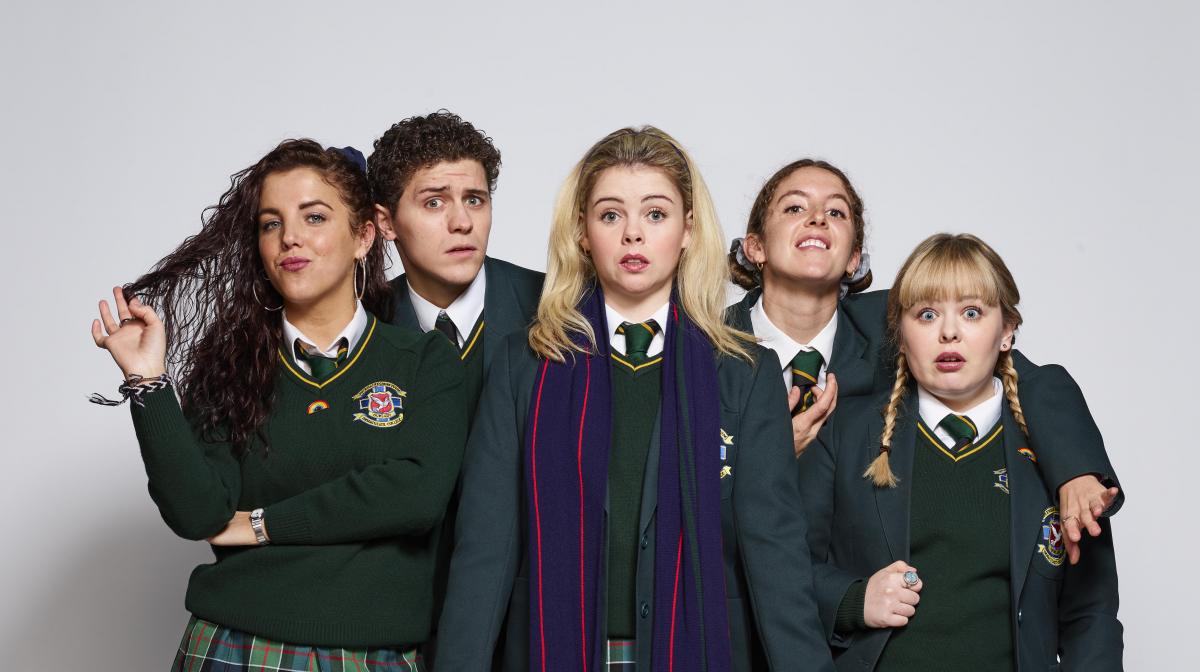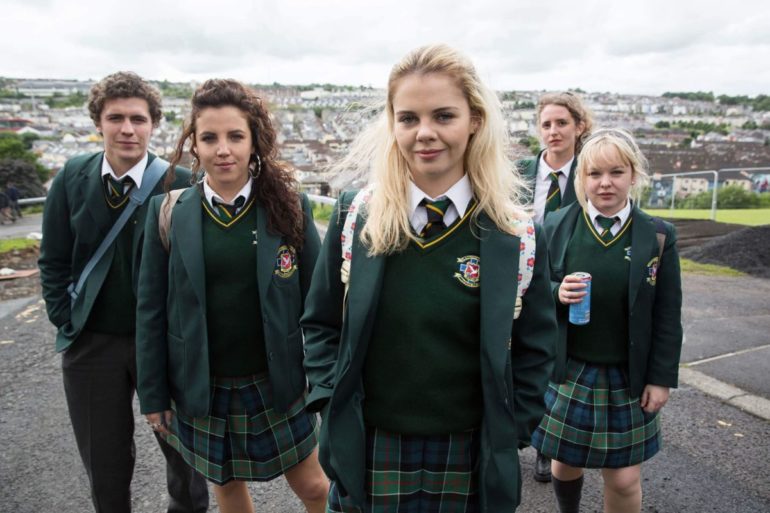With uniquely amusing characters, ridiculously awkward teenage antics and a consistent flow of subtle but effective moments of humour, Derry Girls has established itself as one of the most popular comedies of recent years. Though it may be coming to a close after only three seasons, the show has competed with Fleabag at the BAFTAs and been compared with British classics like The Inbetweeners – including by Cultured Vultures’ own TV editor, Huw Saunders.
Yet, like Huw, I believe that such comparisons are merely surface-level. Derry Girls offers much more than outright comedies like The Inbetweeners: an intelligent analysis of The Troubles in the 1990s, hard-hitting social messages and a storyline focused on unconditional love between a group of unlikely friends take the programme to a whole new level. It’s smart, sharp and has a lot to say, and is worthy of the extensive praise it has received.
Growing up in England, I have to admit that I was embarrassingly uninformed over the extent of The Troubles before Derry Girls, but the show does a brilliant job of highlighting the gravity of the conflict in Northern Ireland. The programme incorporates a number of real-life events, such as Bill Clinton’s visit to Derry, the 1995 IRA ceasefire, and the Orange Order parades, and because of this presents a surprisingly educational experience for the more ignorant among us, such as myself.
Before watching Derry Girls I had no knowledge of how heavily the period weighed in the history of Northern Ireland, nor of the volume of casualties caused by the atrocities. When one particular episode spells out the number of deaths caused by The Troubles – well over 3,000 – I felt slightly ashamed that I was so unaware of the extent of the conflict.

In this way, Derry Girls fits the current demand for programmes that provide an insight into otherwise overlooked moments in history, which could explain its success in the US as well as England. This has arguably been driven by Netflix, whose most popular shows have the ability to both entertain and inform – seen with Mindhunters, which focuses on the first studies of serial killers and has received outstanding feedback from viewers, and When They See Us, in which five New York teens are falsely accused of a brutal attack.
What is even more impressive, however, is writer Lisa McGee’s ability to make these historical events personal to the characters on screen, having drawn upon her own experiences as a Northern Irish teenager in the 90s. The Troubles are excellently incorporated into the humour of the show, with entire episodes based around the seemingly more trivial consequences of the crisis, but they are consistently built on a wider message.
This is seen in the episode ‘The Concert’, in which the gang are prevented from seeing their beloved Take That in Belfast as a result of a bomb threat. This development leads to an enjoyable road trip for the girls, but is underpinned by the mentality of Northern Irish teenagers at the time. There may be real danger around, but the appeal of Robbie Williams is too much for them to ignore. This slightly distorted way of thinking may well be a comment on the typical mentality of many teenagers, but it could also point out a bigger issue – the normality of conflict for young people in the country. What starts as a simple, absurd premise becomes something more, and full credit to the writing for that.
McGee also utilises The Troubles for another important purpose – demonstrating the futility of war. The ordinary situations the main characters find themselves in are consistently contrasted with the extremity of the nation’s struggles at the time – as Ma Mary (Tara Lynne O’Neill) worries about why her friend is throwing away her big bowl, the rest of the country is worried about the next violent attack.
This approach may seem to make light of the situation on the surface, but its clever execution helps to make a compelling point: the disputes of leaders may drag countries into chaos, but the lives and endeavours of ordinary people continue. War is painted as important and necessary by those who peddle it but for the average person it is deplorable and a waste of life, which McGee expertly points out by showing the main characters’ longing for life over death – characters who ultimately have little interest in the explanations or excuses for conflict.
This is best emphasised by the final sequence of season one. The camera jumps back-and-forth between Erin’s (Saoirse-Monica Jackson) family, gathered around the television watching a news broadcast of another devastating incident, and the gang as they dance around onstage at school, enjoying themselves and acting as young, carefree people should. The sharp contrast between the horror of the conflict and the vibrancy of the gang, as The Cranberries’ ‘Dreams’ plays in the background, is a work of genius. McGee’s message of hope is clear as the anger and hatred of war is failing to deter the optimism and compassion of the group. It’s powerful and moving, and not something you expect in your average satellite comedy.
Outside of The Troubles, though, this is a thoughtful, heartwarming story of an unlikely group of friends who, despite constantly making fun of one another, have each other’s backs in difficult situations. Like The Inbetweeners, the show’s comedy does rely on the uncomfortable inelegance of teenage life, and the hilariously cringeworthy scenarios this provides, but what separates Derry Girls is the positive and uplifting bond between the main characters.
This was most vividly demonstrated in the season two finale. As James (Dylan Llewellyn) threatens to return home to England and leave the girls behind, the audience sees the importance of the whole group to one another. Bill Clinton may be in Derry talking about the future of the country, but what matters most to the gang is being together, and this is told poetically throughout the episode. The ending, as they realise they are the Derry Girls (including James, of course) and that they need each other, highlights the soul of the show – something that The Inbetweeners sorely misses. In the latter, the group dynamic built on humiliation and ridicule certainly leads to some laughs, even if this is often through cheap humour, but the general lack of humanity and compassion eventually becomes a grind.
By the end of its third season, the absence of engaging relationships, or indeed character development, makes The Inbetweeners feel repetitive and slightly disengaging. In Derry Girls, the strengthening of the gang’s friendship and their individual development as people is more than enough to keep things interesting.
Derry Girls is one of the most amusing shows on TV, but it is so much more than that. With educational messages, commentary on the futility of war and a heartwarming dynamic between its main characters, this is an intelligent comedy that leaves its mark on the viewer.
Depending on what creator McGee is plotting, the show may well end after season three – but it will be interesting to see where the characters go from the end of last season. Coming to terms with potential peace could lead to some more humorous yet profound storytelling, and seeing what the girls have in store after graduating secondary school could provide a nice ending to their arc. Wherever Derry Girls goes from here, though, there is no doubt that it will go down in history.
Some of the coverage you find on Cultured Vultures contains affiliate links, which provide us with small commissions based on purchases made from visiting our site. We cover gaming news, movie reviews, wrestling and much more.



